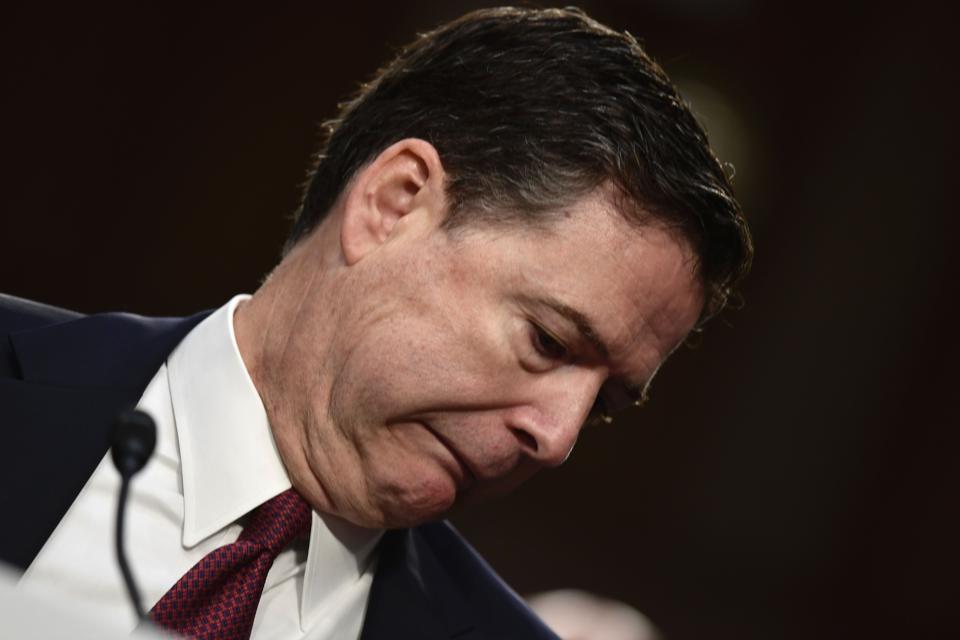

Published 30-09-2017, 00:00
Kenneth Rapoza
I cover business and investing in emerging markets. I've written about Brazil pre-Lula and post-Lula and spent the last five years covering all aspects of the country for the Wall Street Journal and Dow Jones. Meanwhile, for an undetermined amount of time, and with a little help from my friends, I will be parachuting primarily into Brazil, Russia, India and China. But will also be on the look out for interesting business stories and investing ideas throughout the emerging markets.

The Department of Homeland Security and the National Security Agency both say the Russian government hacked into U.S. election officials computers.
Mark Zuckerberg turns over to congressional investigators some 3,000 advertising accounts linked to Russian entities who filled Facebook with anti-Hillary propaganda. Twitter does the same.
Paul Mannafort shook a Russian guy's hand somewhere in Ukraine, did a quiet business with them, and is now expected to be indicted. He will become Trump's version of Lewis "Scooter" Libby, the neocon Republican sidekick to Dick "Vader" Cheney who took the fall for outing a CIA agent named Valerie Plame during the height of Washington's totally false Iraq WMD narrative.
There is another fairy tale unfolding in Washington. They do as good a job as Hollywood and the Disney channel at moving us to tears, or fits of laughter.
To date, we know nothing about the leaked emails from the Democratic National Committee. Those DNC emails made Hillary and her campaign manager John Podesta look unsavory, revealing the DNC's plot to hold Bernie Sanders back in favor of Her. That leak kicked off Russia Gate. Podesta whispered to his friends in Washington that it was the Russians who sent the emails to Wikileaks, and the like-minds went to work conjuring up plot twists. Julian Assange says it wasn't Russians. Congressman Dana Rohrabacher met with Assange this summer and has a better handle on how they got to Wikileaks. Rohrabacher is not talking. It is probably safe to say that it is not the Russians. Let's give it 70% odds that it's not the Russian government, or a Russian person behind the DNC emails leak.

Then there is the NSA leak by contractor Reality Winner, now in jail. The leak says that Russian government hackers were spear-phishing email accounts of some electoral officials. In that leaked document, it was clear that only one official's email was compromised, meaning he fell for spam, to put it in layman's terms. No, the Russians did not use his email to turn Hillary votes into Trump votes.
There's this note by the DHS on Russian hacking in Wisconsin, once a surety: oops, our bad. They didn't. California said the same thing yesterday; nope, Russians didn't compromise our computers or the integrity of the election.
There's California's favorite Silicon Valley star, Zuckerburg, saying he found one Russian trolling farm that paid $100,000 to send out anti-Democratic Party messaging and other oddball items that had nothing to do with Trump. Here's what Zuckerberg says about that huge propaganda effort: "Campaigns spent hundreds of millions advertising online to get their messages out. That's one thousand times more than any problematic ads we've found." Problematic ads here likely means pro-Trump content. Not surprisingly, Hillary fans hate him now because he didn't find enough damning evidence of Russian fake news to delegitimize the election.
Twitter said the same. It found a couple hundred Russia accounts versus the tens of millions of non-Russia accounts. The biggest one was by a state run Russian media company, called Russia Today, which paid for advertising on the social media network to promote its stories just like MSNBC, CNN, Fox, ABC, NBC, CBS and every other mainstream media outlet does. A rock thrown in a sea doesn't cause a rip current.
And now for an exercise in pure futility. For unless this gets a million hits, and it won't, this is whistling in the dark, I know. But for my regular Russian news readers, including the hedge funds and the macro investment research shops, and the political junkies somewhat terrified of owning so much as a VanEck Russia ETF, here's what a real election meddling scenario looks like. This might make you feel better, or give you something to read on your lunch break.
Names have been disguised to protect the innocent.

How To Meddle In A Foreign Election*
It's March 2016. Donald Trump is not an admirable character. No one takes him seriously. He doesn't stand a chance of being nominated by the Republican party. The Russians want to change that. Bernie Sanders won't have support in congress if he wins, even though they like his foreign policies. The rest of the lot all hate the Russians. Whatever it is the Russians do, they backed the winning horse. Despite his leadership defects and character flaws, Trump is duly elected 8 months later.
The American news media try to decipher what happened.
They recall that Russian leaders made it clear that they supported the removal of sanctions and Trump's stance against regime change in Syria. The Russians liked the idea of Trump wanting to work together to defeat Muslim terrorism, a problem they have back home. Maybe Trump would be more open to a multipolar world, which is in line with Vladimir Putin's worldview. They saw Hillary as going against all that.
How do we know this? Top ranking Duma MP Alexei Ustinovich had traveled to Washington in June where he met with his American counterparts and members of the political press. His message was seen as coming directly from the Kremlin: if you elect Hillary, Russia and the U.S. will end up fighting a war over Syria and Ukraine. Russia was belligerent on this. Hillary was bad news. You're getting a Cold War, and people will die.
Ustinovich showed solidarity with anti-Hillary media, quick to do appearances on Fox News and Breitbart radio. He dined with Steve Bannon and was a guest on a Bill O'Reilly podcast that was even deemed too controversial to run on Fox News. He later appeared at a Trump rally in October, smiling and clapping at cheers of "lock her up!"
Back in Moscow, the assistant secretary of foreign affairs, Renata Kazan, the woman in charge of U.S. Russia relations, noted in a speech to the Russia-U.S. Chamber of Commerce on Oct. 31, 2016 that she had traveled to Washington, Madison and Pittsburgh to talk with 'Blue State' voters. She said the same during a sit-down with the Brooking Institute, where she even went so far as saying a private NGO in Russia, backed by the Kremlin, called the Endowment For Peace, was funding a Trump SuperPAC called Americans For Saner Politics. She announced their newest grant to fund independent media in the U.S. She laughed about how she handed out cookies to people at town halls listening to speeches by local Republicans in support of Trump. It was all true, of course, because local media had pictures of it: they were oatmeal and raisin cookies.
The NSA and CIA got wind of this. They spoke to their spooks in Moscow. Someone bugged Kazan and leaked a phone call she had with Russian ambassador Sergei Makebelieveikov between Washington and Moscow. It is leaked to the international press, with the BBC being the first to pick it up as evidence that the Russians were hotly involved in the American election. In the phone call, we learn in detail their preferences for a post-Obama government. Their man is Donald J. Trump.
During the phone call, Kazan states in her own words, "Trump is our guy". This is more than hearsay. There's actual tape recordings of the conversation and The Washington Post publishes the transcript.

It was clear to most that the Russians had a horse in the race at the highest level. They also thought Bernie might be a problem. In the call, Kazan says, "I don't think Sanders should be president. I don't think he will have the support, even though he is also against regime change in Syria and is not strong either way on the Ukraine issue. I don't think we need him. Trump is better and hopefully some other Republicans will eventually help from the outside." Russia is sanctioned by Washington because of its backing of a separatist movement in east Ukraine.
Makebelieveikov agrees. "We need someone with an international name, an international personality so we can midwife this entire transition," he says, mentioning how it will help with elections in Europe as well.
After the election, an editorial in the Kommersant business daily celebrates Trump's win and calls the Woman's March demonstrators sore losers; they are ridiculed and vilified as being up to no good. Ne'er do wells, for sure, who cannot be trusted and do not have America's best interests at heart. The op-ed says it all, "Washington is now controlled by a pro-Russian president."
That's all we know.
Imagine for a second if all of this were true. Instead of names of Russian businessmen doing business with Trump campaign chiefs, you have Trump surrogates talking to Russian government officials about the election. You have members of Vladimir Putin's cabinet cheering at Trump rallies in MAGA hats. You have Russian NGOs funding opposition movements.
If such a thing were known, we could say with certainty that the Russians were meddling. At the very least, they were actively cheer leading Trump whether or not his campaign enlisted the help. These weren't techies in the Russian government, or a few Russian guys creating an anti-Hillary troll army. This is out in the open, here we are, here is who we like, here is what we want. That boldness says something, I think. It's an arrogance that would drive Washington absolutely batty.
All of the above is based on what went down three years ago in a country once firmly in Russia's orbit. As the U.S. likes countries in its orbit, so does Russia. This country was Ukraine, of course. All of this had happened before. Senator John McCain plays the role of imaginary Duma MP Ustinovich; fake bureaucrat Kazan is long time bureaucrat Victoria Nuland. Makebelieveikov is U.S. ambassador to Ukraine, Geoff Pyatt.
To Russia, that looks like meddling.

We can just ignore what it looks like. But if so, don't proclaim on other politically relevant issues that we have to be made uncomfortable in order to have a better understanding of reality. The reality, more and more, looks like the powers-that-be have got nothing on Trump and Russia collusion, and the biggest story of all, the leaked DNC emails that spun Hillary like a top, was not a Russian operation.
Hacking the election equipment? Didn't happen. Spear-phishing? Ok. One guy fell for it, as far as we know. Let's pretend 12 did. What does that mean? They opened spam and their computer has been compromised. How does that manipulate American voters. Make the connection if you can.
Not too long ago, one of the left's foremost experts on American foreign policy, Noam Chomsky,told Democracy Now! radio that the Russian story of collusion and meddling was one of the biggest hypocrisies conjured up in recent memory. As Chomsky put it, "It's a joke. The United States doesn't just interfere in elections; it overthrows governments it doesn't like. The U.S. government under (Bill) Clinton intervened openly and blatantly to get their man Boris Yeltsin elected. So why focus so much on the one element in Trump's program that is fairly reasonable: trying to reduce tensions with Russia? Efforts to reduce tensions should be welcomed."



_jpg/250px-ElbeDay1945_(NARA_ww2-121).jpg)





